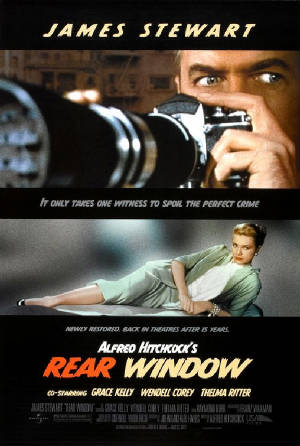|

(1954, directed by Alfred Hitchcock)
- inducted 2013 -
"Alfred Hitchcock's pre-beatnik era West Village, seen through the eyes of the temporarily
incapacitated, apartment-bound Jeffries (Jimmy Stewart), is reduced to little more than a few converted tenement apartment
buildings, a narrow, busy street (Bleecker?) in the distance, with a sumptuous ambient soundtrack, a mixture of the most distant
and near city sounds. Community as tableau has rarely been so crystalized as in Rear Window, accomplished largely by,
as many have written about, how the film functions as a metaphor for the role of the less passive moviegoer or media consumer:
how we observe, process and conclude.
"Jonathan Rosenbaum's point in his review of Rear Window, that Jeffries channel surfs between his various courtyard
neighbors, is an apt one, especially if one follows the trajectory of media since the film's release in 1954. The internet
is perhaps the most apt medium to compare the viewing habits of Jeffries' to: the outside world as an aquarium, sometimes
interactive, but always open to one's obsessive, investigative tendencies. Most remarkable, however, is that Hitchcock presents
all of Jeffries' conclusions as objective facts, allowing the film to function as a supremely disturbing thriller, nearly
removing psychology altogether. It that device especially that defines how, suggested as much in the film, interactivity between
medias and 'real life' allows one their own truths. One's microcosmic world, a courtyard neighborhood here, is a dollhouse
kept at a (mostly) safe distance."
~ Michael Lieberman
Principal cast: James Stewart, Grace Kelly, Wendell Corey, Thelma Ritter, Raymond Burr, Judith Evelyn, Ross
Bagdasarian, Georgine Darcy, Sara Berner, Frank Cady, Jesslyn Fax, Rand Harper, Irene Winston, Havis Davenport
Screenplay by John Michael Hayes
Based on a short story by Cornell Woolrich
Director of photography: Robert Burks
Production design by Joseph MacMillan Johnson and Hal Pereira (art direction), Sam Comer and Ray Moyer (set decoration)
Costume design by Edith Head
Film editing by George Tomasini
Original music by Franz Waxman
Makeup by Wally Westmore
Sound recordists: John Cope and Harry Lindgren
Produced by Alfred Hitchcock (uncredited)
USA
Duration: 112 minutes
Languages: English
Filmed in color (Eastmancolor/Technicolor)
Sound mix: Mono (Western Electric Recording)
Aspect ratio: 1.66:1
Produced by Paramount Pictures and Patron Inc.
Released in USA by Paramount Pictures
Premiered in New York City, NY on 1 August 1954
Awards and honors:
- National Film Registry selection, 1997
- Selected as one of Roger Ebert’s “Great Movies,” 20 February 2000
- NYFCC Award, New York Film Critics Circle, 1954: Best Actress, Grace Kelly (won)
- National Board of Review, 1954: Best Actress, Grace Kelly (won)
- Academy Awards (USA), 1954: Best Director, Alfred Hitchcock (nominated)
- Academy Awards (USA), 1954: Best Writing, Screenplay (nominated)
- Academy Awards (USA), 1954: Best Cinematography, Color (nominated)
- Academy Awards (USA), 1954: Best Sound Recording (nominated)
- BAFTA Awards, 1954: Best Film From Any Source (nominated)
- DGA Awards, Directors Guild of America, 1954: Outstanding Directorial Achievement in Motion Pictures, Alfred Hitchcock (nominated)
- WGA Awards, Writers Guild of America, 1954: Best Written American Drama (nominated)
- NYFCC Award, New York Film Critics Circle, 1954: Best Director, Alfred Hitchcock (2nd place)
|

